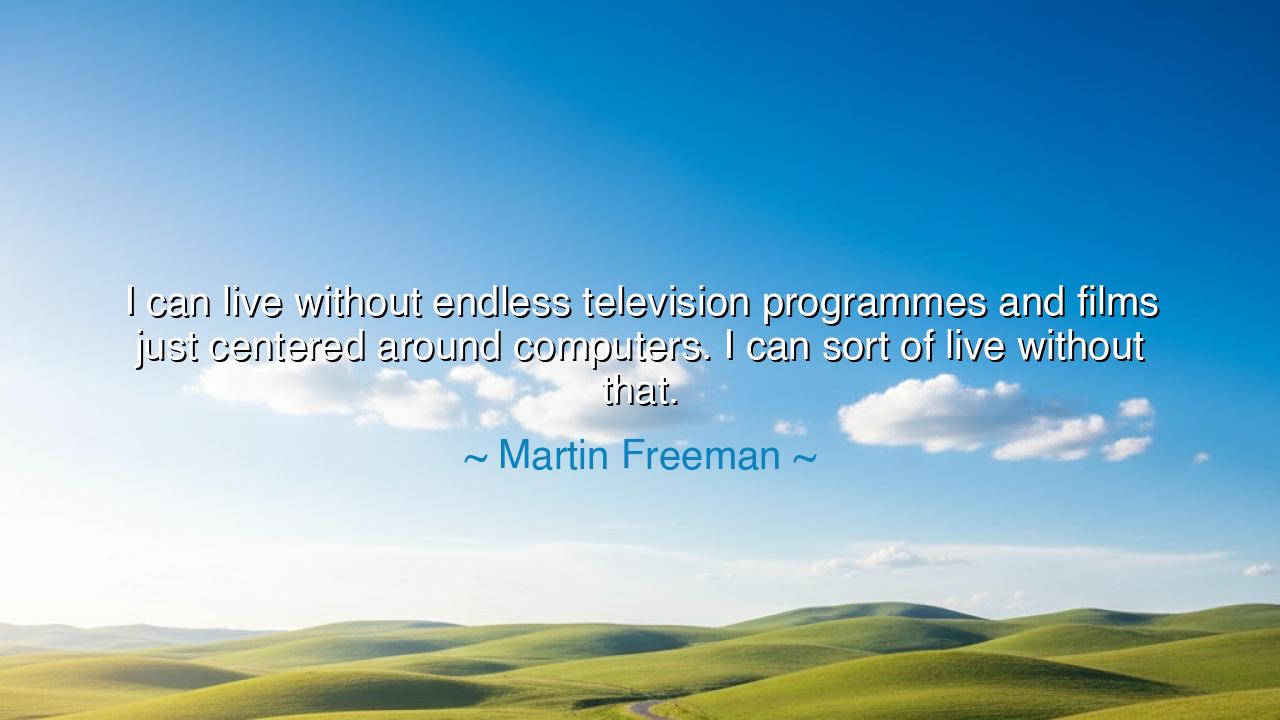
I can live without endless television programmes and films just
I can live without endless television programmes and films just centered around computers. I can sort of live without that.






“I can live without endless television programmes and films just centered around computers. I can sort of live without that.” — Martin Freeman
Hear the voice of Martin Freeman, a craftsman of the acting art, who speaks with quiet rebellion against the flood of hollow spectacle. His words, though simple, carry the weight of a man longing for truth in an age of illusion. When he says he can live “without endless television programmes and films centered around computers,” he does not speak only of entertainment. He speaks of the human spirit—of its hunger for stories that breathe, for characters that feel, for art that reflects the beating heart of life, not the blinking light of machines.
In his declaration, Freeman stands as a modern philosopher, lamenting not the rise of technology, but the impoverishment of imagination that often accompanies it. He reminds us that the art of storytelling is ancient and sacred. It was born not of circuits and screens, but of firelight and voice—of one human speaking to another in the darkness, passing down wisdom, fear, and hope. The computer, wondrous as it is, can magnify the tale but can never replace the soul that tells it. To build stories around it endlessly, Freeman suggests, is to forget that the heart, not the motherboard, is the true source of drama.
The ancients would have understood his grief. In the time of Socrates, the philosopher warned that the written word itself might dull the memory, for it would tempt men to read instead of remember. Every age has its inventions, and every invention its seduction. In our age, the screen has become both mirror and master, reflecting back not who we are, but who we pretend to be. Freeman’s words call us to awaken—to lift our eyes from the endless glow and remember that art, at its core, is not about machines, but about meaning.
Consider the story of Charlie Chaplin, who, in his film Modern Times, stood amidst the grinding gears of an industrial age that threatened to consume the worker’s humanity. He played a man caught—literally—within the machinery of progress, losing himself in its endless motion. Yet even then, he laughed, he loved, he endured. Chaplin’s message was clear: technology must serve the human, never the other way around. Freeman’s sentiment echoes that same eternal truth. He can live without the obsession with computers because he seeks something greater—the humanity behind the lens.
Freeman’s perspective is not the rejection of innovation, but the reclamation of balance. He, like many artists before him, warns us against worshipping the tools of creation over the act of creation itself. Just as a painter is more than his brush and a poet more than his pen, the storyteller is more than his screen. When art becomes enamored with its machinery, it forgets its purpose—to stir the heart, to reveal the soul, to remind us of our shared fragility. In choosing to “live without” such distractions, Freeman honors the ancient discipline of simplicity, the purity of expression unclouded by spectacle.
And yet, his words carry not contempt, but longing. He does not despise the modern world; he merely refuses to drown in it. Like a sailor steering through the storm of digital noise, he seeks the shore of authenticity. His is a gentle reminder that life itself—with its silence, its conversation, its imperfection—is richer than all the digital worlds we could ever invent. For a story drawn from truth, even told simply, shines brighter than a thousand stories born from circuitry.
So, my children of the glowing age, remember this lesson: live with your machines, but not for them. Use the screen as a window, not a wall. Let technology amplify your voice, but not replace it. Turn sometimes from the artificial light and seek again the warmth of real faces, real words, real laughter. For in that simplicity, you will rediscover what Freeman cherishes—the art of living, not simulated but sincere. And in that rediscovery, you will find that what you thought you could not live without, you can indeed let go of—and live more fully because of it.






AAdministratorAdministrator
Welcome, honored guests. Please leave a comment, we will respond soon